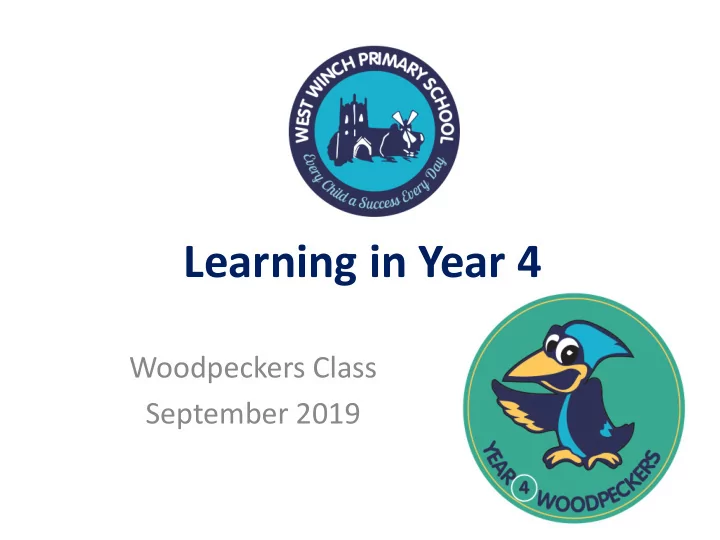

Learning in Year 4 Woodpeckers Class September 2019
What we learn • All subjects in the National Curriculum • English – speaking and listening, reading and writing • Maths • Science • Art and design, computing, design technology, geography, history, music, PE • French or Spanish (in Key Stage 2)
Reading scheme Our books are organised into book bands. Children work through these book bands as they learn to read.
Reading By the end of Year 4 we hope that children will be reading books from the lime, brown or grey book bands.
Phonics • The sounds that letters make • Sounds are blended together to make words wish = w-i-sh chin = ch-i-n • Sounds should be said properly – imagine that you are saying the word in slow motion • There is more information in your child’s reading record book
Recognising words • Lots of words cannot be sounded out • Your child may be given these words on flashcards so that they can practise reading them • The words your child should be able to read at the end of each year group are shown in the reading record
Rising Stars reading tests
How you can help your child with reading • Talk about books, stories and information • Read to your child at home • Read with your child at home • Ask questions • Use the guidance contained with the latest newsletter
Useful questions • What happens in the story? • What is the book about? • Who is in the story? • What do you think this character is like? How do you know? • What do you think will happen next? • What is the title of the story? • Is this book fiction or non-fiction? How do you know? • What did you learn in the book? • What is your favourite part of the story? Why? • Who is your favourite character? Why?
Writing Key skills in Year 4. Children… • Group similar information together in paragraphs in non-fiction writing, using headings and subheadings if necessary • Discuss and record ideas when planning • Consider the needs of the reader and provides background information • Choose nouns or pronouns appropriately for clarity and cohesion and to avoid repetition • spell all of the Year 3 & 4 word list • use the prefixes il-, ir-, re-, sub-, inter-, anti-, auto- • use the diagonal and horizontal strokes that are needed to join letters • use and punctuate direct speech, including punctuation within and surrounding the inverted commas • understand the difference between the plural and possessive – s • Can proof read for errors
Writing
How you can help your child with writing • Help them to learn spellings • Help them to sound out words carefully to write them • Talk about stories • Encourage them to find out about new words • Encourage and support them to complete their English homework
Maths Key skills in Year 4. Children… • count in multiples of 6, 7, 9, 25 and 1000 • can round any number to the nearest 10, 100 or 1000 • add and subtract numbers with up to 4 digits • choose the appropriate operation to solve one- and two-step problems • recall multiplication and division facts for multiplication tables up to 12 × 12 • can find the effect of dividing a one- or two-digit number by 10 and 100, identifying the value of the digits in the answer as units, tenths and hundredths • solve simple measure and money problems involving fractions and decimals to two decimal places • measure and calculate the perimeter of a rectilinear figure (including squares) in centimetres and metres • read, write and convert time between analogue and digital 12 and 24-hour clocks • interpret and present discrete data using bar charts and continuous data using line graphs Name and describe 2D and 3D shapes
Rising Stars maths tests
How you can help your child with maths • Regular practice of timetables – timestables.co.uk • Give your child opportunities to handle money, learn to tell the time and understand it • Involve your child in measuring things (length, weight and volume) • Notice and talk about numbers, measures and shapes in the real world • Ask questions and talk about number problems
Assessment • Every half term ‘Rising Stars’ assessments used to judge attainment colour for each child. • These identify performance in reading, maths and GPS. • Written work assessed against a set of curriculum objectives from the writing target books. • Assessment colours : • RED - Not on track to meet their expected year group targets. • GREEN – On track to meet their expected year group targets. • BLUE – On track to exceed their expected year group targets.
Recommend
More recommend